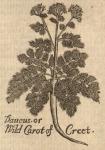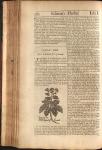I. The Names. It is called in Greek, Δαυκος : In Arabick, Dauco, and Giezar : In Latin also Daucus, Daucum, and Daucium, and Daucus Creticus : In English, Daucus, and Dauke, and Candy Carrots.
II. The Kinds. Parkinson makes sixteen kinds of Daucus’s, many of which are nothing to our purpose : Those which we are chiefly to treat of in this Chapter, are the Candy or Cretick Kinds, which Dioscorides makes to be three, viz.
I. Daucus Creticus verus Dioscoridis, The true Daucus of Candy. (Athamanta cretensis -Henriette)
2. Daucus Selinoides, The Parsley Leav'd Daucus. (unknown -Henriette)
3. Daucus Coriandri foliis, Daucus tertius Dioscoridis Bello, Coriander Leav'd Daucus, or Bellus his third Daucus of Dioscorides. (Pimpinella peregrina -Henriette)
4. To these we think good to add a second kind of the Daucus Selinoides, which is Daucus Selinoides maxima, The greatest Parsley Leav'd Daucus. (unknown -Henriette)
III. The Descriptions. The True Daucus has a Root small, long, and white ( lesser says Gerard, than the Root of a Parsnip, which is of a fragrant smell, and almost as quick and sharp in Taste as the Seed, but will not abide our Winters here in England, with all the skill we can use, so that we are forc’d to sow it anew every Year. From this Root rise up several Stalks of Winged Leaves, as finely cut as Fennel, but shorter, set at distances one against another, of a whitish or hoary color, smelling a little sweet. From among which rise up divers slender Branches or Stalks a Foot high, bearing at their Tops small Umbles of white Flowers, and after them small hoary grayish Seed, somewhat long and round, and of a sharp or quick Smell and Taste.
IV. The second Daucus has a Root somewhat great, thick, long and white, with a bush of hairs at the Head, as many other Umbeliferous Plants have, and of a hot and sharp taste, as the Seed also is ; from whence rise up large Stalks of somewhat broad pale green Leaves, bigger than Parsley, and with divisions of the same fashion and manner, next the ground : And also large Stalks almost two feet high, with the like Leaves at the Joints, but shorter ; and at the tops spokie rundles of white Flowers, which turn into long crested Seed, bigger than ordinary Fennel Seed, and of a yellow brown color.
V. The third Daucus of Dioscorides, according to Honorius Bellus his account, has a Root great, thick and short, perishing yearly. The whole Plant is Aromatical, and both Root and Leaf are eaten by the Cretians as a common Sallet Herb. From this Root spring several Stalks of fine cut Leaves, not much unlike to the Leaves of Coriander, but lesser and thicker. The Stalks are near two Feet high, with great and swollen Joints, ( and therefore called by some Seseli nodosom, knotted Hartwort, but by Bauhinus, Daucus Criticus nodosus Umbella lutea ) and smaller Leaves at them, at the tops whereof grow yellow Umbles of Flowers ( but white with us in England ) which being past away, there comes much Seed, larger than that of Fennel.
VI. The fourth Daucus, which is the large or largest kind of the Parsley Leav’d, has a Root sometimes as large as ones Arm, or being young, of the bigness of ones Thumb, parted into several Branches at the bottom, and covered with a rugged black Bark, of a Viscous taste at the first, but sharp afterwards, so as to cause spitting, having at the top many hairy Heads, from whence come several very large, and great Winged Leaves, much divided and dented about the edges, muchwhat like the last, but bigger, and of a pale or faint green color, a little shining on the upper side, and of a greyish ash-color underneath. Among these Leaves rises up, a large, great, crested Stalk, of a Fingers thickness, with some Joints, and Leaves at the Joints, and with Branches also between them : at the tops whereof stand small Umbles of whitish Flowers, and somewhat like Seed to the second kind, but larger.
VII. The Places. Candia is the Natural place of their Growth, but with us in England they are only nourished up in Gardens. The first has been found upon several Mountains of Germany ; and upon the Hills and Rocks of Jura near Geneva, from whence it has been transported into several of our more Northern Regions.
VIII. The Times. They flower in June and July, some earlier, some later ; and their Seed is ripe in August ; some of it ripening in the time of flowering.
IX. The Qualities The Seed and Roots are hot and dry in the third Degree ; the Herb scarcely exceeds the second Degree of heat, and therefore is less powerful. They are Aperitive, Attractive, Digestive, Carminative, Diuretick, Cephalick, Stomatick, Nephritick, Hysterick, Lithontriptick, Alterative, Alexipharmick and Spermatogenetick.
X. The Specification. It is chiefly dedicated to the Strangury, Stone, and stoppage of Urine.
XI. The Preparations. You may make hereof,
1. A liquid Juice of the Herb and Root.
2. An Essence of the same.
3. A Pouder of the Seed.
4. An Infusion of the Seed.
5. A Decoction of Seed or Root, or both.
6. A Cataplasm of the Herb and Root.
7. A Distilled Water.
8. A Spirituous Tincture.
9. An Acid Tincture.
10. An Oily Tincture.
11. A Saline Tincture.
12. A Spirit.
13. Α distilled Oil.
14. Potestates or Powers.
15. An Elixir.
16. A Salt.
The Virtues.
XII. The liquid Juice of the Herb and Root. It helps the Strangury, provokes Urine, and the Terms, and expels both Birth and After-birth, and is good for those who have been bitten by the Phalangium, or any other Venomous Beast. Dose four spoonfuls in Wine.
XIII. The Essence. It has all the Virtues of the liquid Juice, and is stronger, finer, and a much more noble Medicine : It prevails against Vapors and Hysterick fits, as also the malignity of the Plague, or Pestilence. Dose one or two ounces in generous Wine, Morning and Night, or three or four times a Day, as the necessity or extremity may require.
XIV. The Pouder of the Seed. This ( according to Authors ) has that powerful heat in it, that it becomes a principal Medicine to help the Strangury, to ease the pain, and remove all stoppages of Urine. It provokes the Terms, facilitates the Delivery, and brings away the Dead Child, and After-birth, and helps Vapors and Hysterick Fits. Dose one dram, to one dram and half, in a Glass of White Port Wine, Morning and Night, and in time of a Paroxysm.
XV. The Infusion of the Seed in Wine. It has all the Virtues of the Pouder, but I fear not full out so effectual. Dose half a Pint, Morning, Noon, and Night.
XVI. The Decoction of Seed, or Root, or both. It ought to be made in White Port Wine, and so given to drink, two, three or four times a day, half a Pint at a time : It has the Virtues both of the Essence, and Pouder of the Seed ; and a most famous thing against the Plague, the Patient being put to Bed, well covered, and so made to Sweat upon it.
XVII. The Cataplasm. The Herb, but more especially the Roots made into a Cataplasm, by beating in a Mortar, and so mixed with Hogs Lard, and applied, does ease, discuss, or asswage Tumors or Swellings in any part. Made into a Mixture or Cataplasm with Honey, and applied to the Throat, it eases an Inveterate Cough.
XVIII. The Distilled Water. It prevails against Stone, Gravel, Sand, Strangury, and all stoppages of Urine, but is weak, in respect to the Juice, Essence, and other more noble Preparations of the Plant, and therefore is only used as a Vehicle to convey other Preparations of the same in.
XIX. The Spirituous Tincture. It is an excellent thing against the Plague or Pestilence, and against all other malign Fevers, as Purples, Spotted Fever, Measles, Small Pox, and Fevers derived from the bitings of Serpents, as Vipers, Rattle Snakes, and others of like kind : It provokes Sweat gently, and defends the Heart after an admirable manner. Dose two, three, or four drams in the Distilled Water, or rather in Wine, or some other fit Vehicle.
XX. The Acid Tincture. It has all the Virtues of the Spirituous Tincture, and if the Fever is very high or intense, is much the better Medicament ; besides the Acid, destroys the Malignity much more powerfully. Dose to one dram, or more, in the Distilled Water.
XXI. The Oily Tincture. In an extremity of the Strangury this is the most powerful Preparation, being given to thirty drops, or more, in a Glass of White Port Wine : It is powerful to discuss Griping Pains, and Torments of the Bowels, to facilitate the Birth, and bring away the Dead Child : It eases Convulsions, and heals Wounds in the Body or Bowels.
XXII. The Saline Tincture. It cleanses the Reins and Urinary Passages, being taken to one dram, or more, in White Wine ; but heals not like the Oily Tincture. It digests humors, and provokes Urine; and the Terms in Women.
XXIII. The Distilled Oil of the Seed. It has all the Virtues of the Juice, Essence, Pouder of the Seed, Decoction, Spirituous, Acid, and Oily Tinctures : and therefore may be given from eight drops to sixteen; being first dropt into Sugar, and then mixed with the Distilled Water, or some other fit Vehicle : It helps the Strangury upon the spot, cleanses the Reins of all Tartarous Matters, and all other the Urinary Parts, provokes the Terms, resists Vapors, and Hysterick Fits, eases the Cholick, produces the Birth, expels watry Humors in Dropsies, and resists the Poison of Mad Dogs, or any other Venomous Creature ; and cures intolerable Pains of the Stomach proceeding from Cold, Weakness, and other like disaffections.
XXIV. The Potestates or Powers. They have all the Virtues of the Oil, and are also more subtil and penetrating, and more pleasant to be taken, being more easily mixed with Wine, or any other potable Liquor. Dose from two to four drams.
XXV. The Elixir. This is yet more excellent and noble than the Powers, being the Tincture of the Seed or Root extracted by the sublimity of the Potestates ; by which you have all the noble parts of the Plant concentrated in one Medicament : and so has all the Virtues of the Juice, Essence, Pouder, Tinctures, Oil, and Potestates, in the highest exaltation. Dose one dram to two drams in a Glass of Wine, Morning and Evening.
XXVI. The fixed Salt. It is strongly Diuretick, strengthens the Stomach, being given in the Acid Tincture, mixed with the Distilled Water, or some other fit Vehiculum. Being taken for some time in White Port Wine, it destroys all Præternatural Acids, in what part of the Body soever, and dissolves the Stone, if it is of a gritty, friable, or brittle substance. The Dose is from a scruple to half a dram, or two scruples, Morning and Evening.
Botanologia, or The English Herbal, was written by William Salmon, M.D., in 1710.
This chapter has been proofread by Jennifer Dyer.


 Page 160
Page 160 Page 161
Page 161